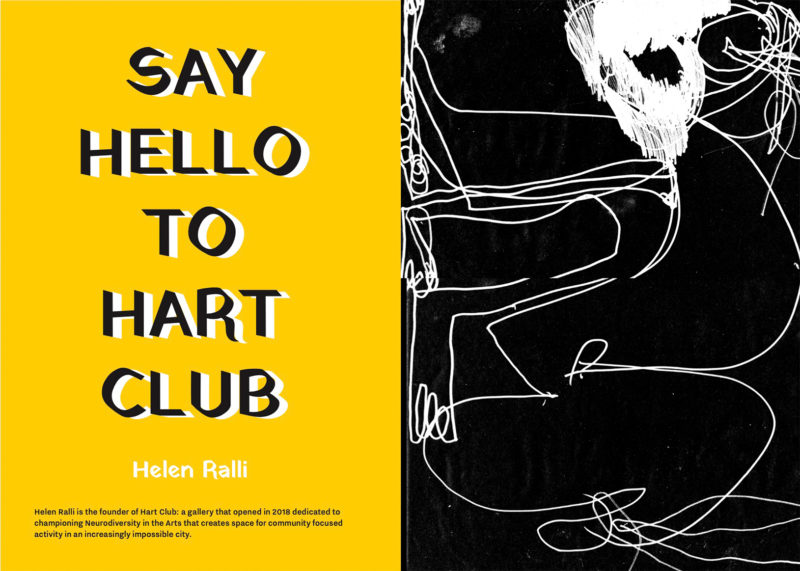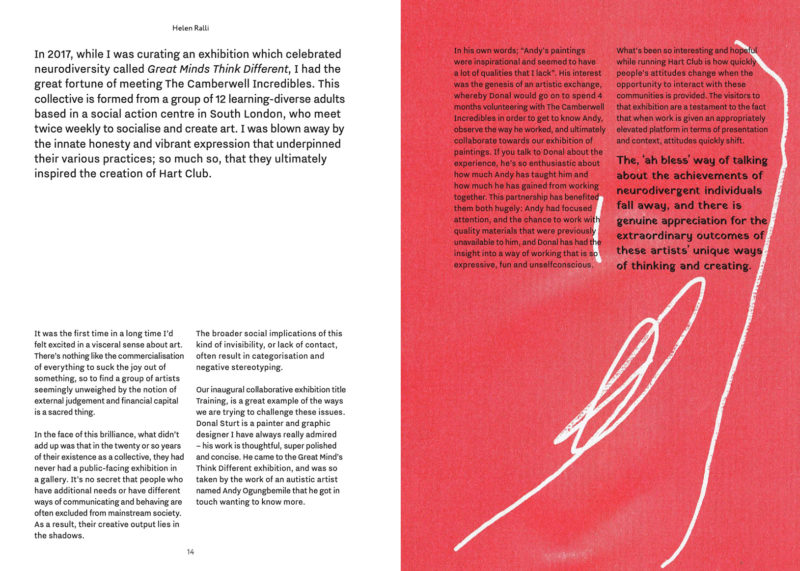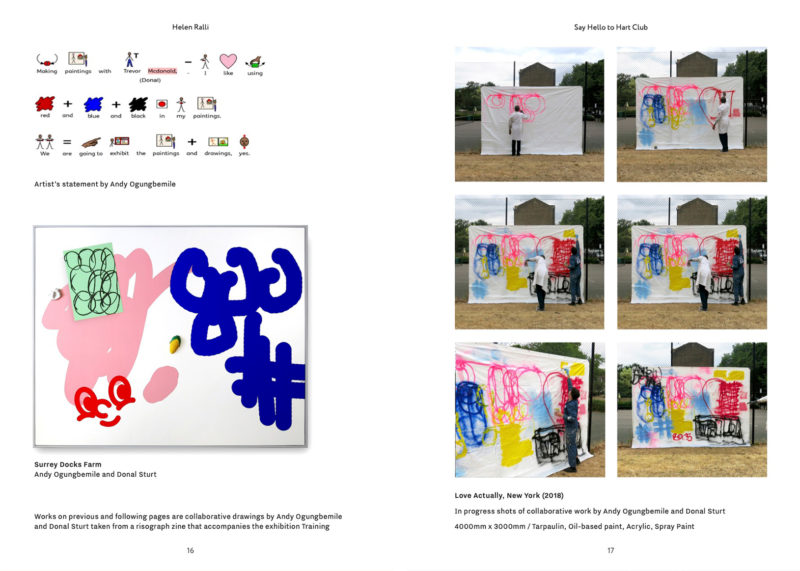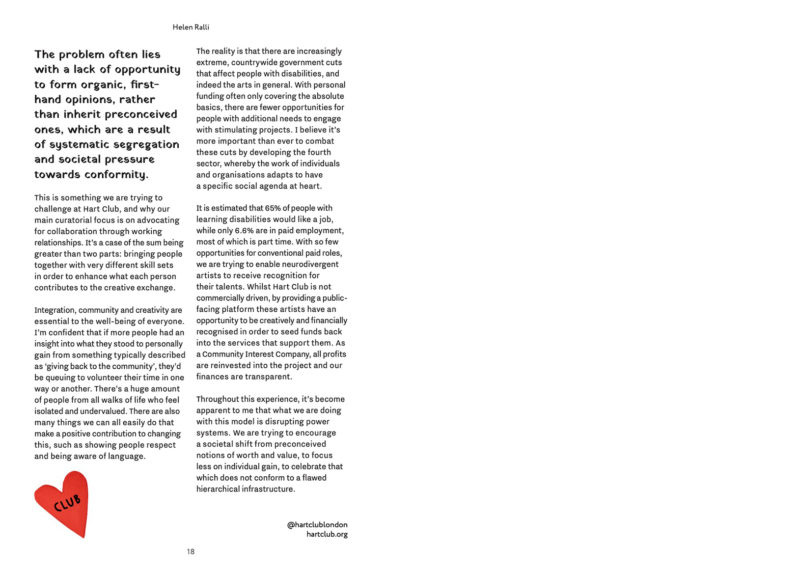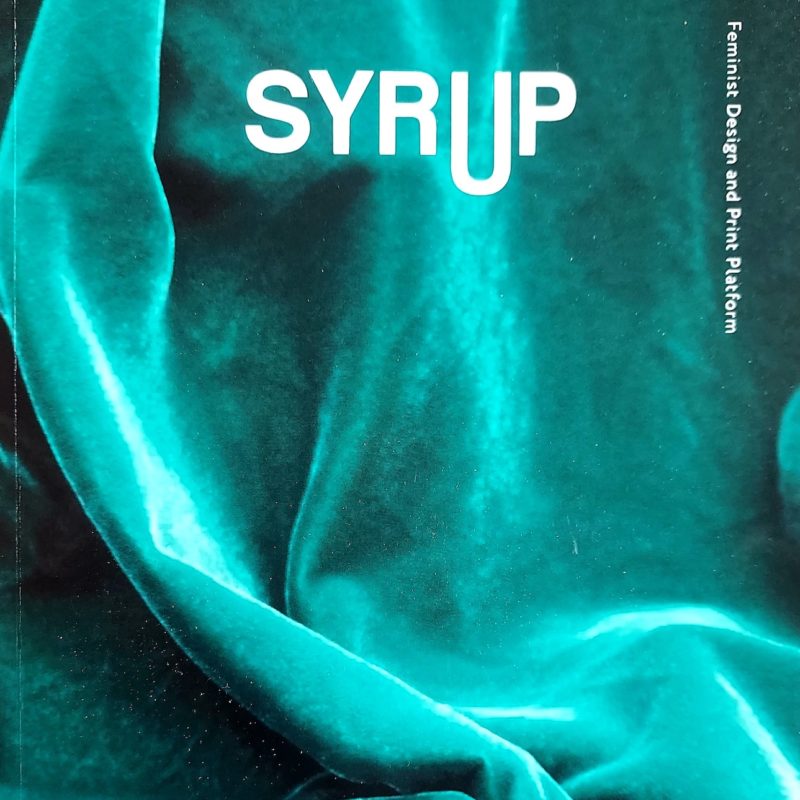Helen Ralli is the founder of Hart Club: a gallery that opened in 2018 dedicated to championing Neurodiversity in the Arts, which creates space for community-focused activity in an increasingly impossible city.
_
In 2017, while I was curating an exhibition which celebrated neurodiversity called Great Minds Think Different, I had the great fortune of meeting The Camberwell Incredibles. This collective is formed from a group of 12 learning-diverse adults based in a social action centre in South London, who meet twice weekly to socialise and create art. I was blown away by the innate honesty and vibrant expression that underpinned their various practices; so much so, that they ultimately inspired the creation of Hart Club. It was the first time in a long time I’d felt excited in a visceral sense about art. There’s nothing like the commercialisation of everything to suck the joy out of something, so to find a group of artists seemingly unweighted by the notion of external judgement and financial capital is a sacred thing.
In the face of this brilliance, what didn’t add up was that in the twenty or so years of their existence as a collective, they had never had a public-facing exhibition in a gallery. It’s no secret that people who have additional needs or have different ways of communicating and behaving are often excluded from mainstream society. As a result, their creative output lies in the shadows. The broader social implications of this kind of invisibility, or lack of contact, often result in categorisation and negative stereotyping.
Our inaugural collaborative exhibition titled Training, is a great example of the ways we are trying to challenge these issues. Donal Sturt is a painter and graphic designer I have always really admired – his work is thoughtful, super polished and concise. He came to the Great Mind’s Think Different exhibition, and was so taken by the work of an autistic artist named Andy Ogungbemile that he got in touch wanting to know more.
In his own words; “Andy’s paintings were inspirational and seemed to have a lot of qualities that I lack”. His interest was the genesis of an artistic exchange, whereby Donal would go on to spend 4 months volunteering with The Camberwell Incredibles in order to get to know Andy, observe the way he worked, and ultimately collaborate towards our exhibition of paintings. If you talk to Donal about the experience, he’s so enthusiastic about how much Andy has taught him and how much he has gained from working together. This partnership has benefitted them both hugely: Andy had focused attention, and the chance to work with quality materials that were previously unavailable to him, and Donal has had the insight into a way of working that is so expressive, fun and unselfconscious.
What’s been so interesting and hopeful while running Hart Club is how quickly people’s attitudes change when the opportunity to interact with these communities is provided. The visitors to that exhibition are a testament to the fact that when work is given an appropriately elevated platform in terms of presentation and context, attitudes quickly shift. The, ‘ah bless’, way of talking about the achievements of neurodivergent individuals fall away, and there is genuine appreciation for the extraordinary outcomes of these artists’ unique ways of thinking and creating.
The problem often lies with a lack of opportunity to form organic, first-hand opinions, rather than inherit preconceived ones, which are a result of systematic segregation and societal pressure towards conformity. This is something we are trying to challenge at Hart Club, and why our main curatorial focus is on advocating for collaboration through working relationships. It’s a case of the sum being greater than two parts: bringing people together with very different skill sets in order to enhance what each person contributes to the creative exchange.
Integration, community and creativity are essential to the wellbeing of everyone. I’m confident that if more people had an insight into what they stood to personally gain from something typically described as ‘giving back to the community’, they’d be queuing to volunteer their time in one way or another. There’s a huge amount of people from all walks of life who feel isolated and undervalued. There are also many things we can all easily do that make a positive contribution to changing this, such as showing people respect and being aware of language.
The reality is that there are increasingly extreme, countrywide government cuts that affect people with disabilities, and indeed the arts in general. With personal funding often only covering the absolute basics, there are fewer opportunities for people with additional needs to engage with stimulating projects. I believe it’s more important than ever to combat these cuts by developing the fourth sector, whereby the work of individuals and organisations adapts to have a specific social agenda at heart.
It is estimated that 65% of people with learning disabilities would like a job, while only 6.6% are in paid employment, most of which is part time*. With so few opportunities for conventional paid roles, we are trying to enable neurodivergent artists to receive recognition for their talents. Whilst Hart Club is not commercially driven, by providing a public-facing platform these artists have an opportunity to be creatively and financially recognised in order to seed funds back into the services that support them. As a Community Interest Company, all profits are reinvested into the project and our finances are transparent.
‘Throughout this experience, it’s become apparent to me that what we are doing with this model is disrupting power systems. We are trying to encourage a societal shift from preconceived notions of worth and value, to focus less on individual gain, to celebrate that which does not conform to a flawed hierarchical infrastructure.’
*According to mentalhealth.org.uk in 2011
